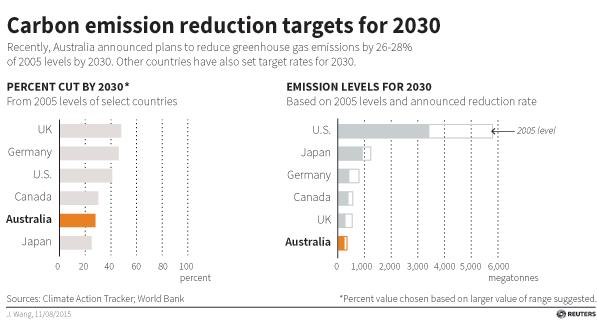How well is Australia fighting climate change?
Stay up to date:
Future of the Environment
The climate change conversation is heating up in the prelude to the 2015 United Nations Climate Change Conference in Paris. Australian Prime Minister Tony Abbott recently announced that his country would reduce carbon emissions by 26-28% by the year 2030. He was then forced to defend his country’s environmental policies when conservationists argued that this reduction was insufficient.
So how does Australia’s promised reduction in carbon emissions compare with commitments made by other countries?
These commitments are part of Australia’s intended nationally determined contributions (INDCs), which are the concrete climate actions that all countries are expected to submit ahead of the climate conference. Australia is the 25th country to submit an INDC.
The goal of the conference is to create a legally binding and universal agreement on climate change that will see a reduction in greenhouse gas emissions, ensuring average global temperature increases stay below 2%.
Source: World Resources Institute
To view an interactive map of all submitted INDCs, visit the World Resources Institute’s Paris Contributions Map.
Have you seen?
How wave energy can power Australia
2015: the year of global action on climate change
How can Australia generate double the energy?
Author: Murray Nicol is a Digital Project Manager at the World Economic Forum.
Image: Sheep graze in front of wind turbines that are part of the Infigen Energy’s Capital Windfarm located on the hills surrounding Lake George, near the Australian capital city of Canberra, Australia, July 17, 2015. REUTERS/David Gray
Don't miss any update on this topic
Create a free account and access your personalized content collection with our latest publications and analyses.
License and Republishing
World Economic Forum articles may be republished in accordance with the Creative Commons Attribution-NonCommercial-NoDerivatives 4.0 International Public License, and in accordance with our Terms of Use.
The views expressed in this article are those of the author alone and not the World Economic Forum.
Related topics:
Forum Stories newsletter
Bringing you weekly curated insights and analysis on the global issues that matter.
More on Energy TransitionSee all
Nii Ahele Nunoo
May 6, 2025
Denise Rotondo and Chris Leong
May 5, 2025
Don McLean
May 1, 2025
Benjamin Denis and Justine Roche
April 30, 2025
Tomoki Matsuno
April 29, 2025
Fabienne Robert
April 28, 2025





